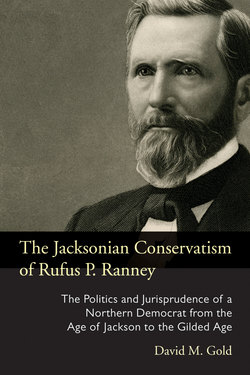The Jacksonian Conservatism of Rufus P. Ranney

Реклама. ООО «ЛитРес», ИНН: 7719571260.
Оглавление
David M. Gold. The Jacksonian Conservatism of Rufus P. Ranney
Отрывок из книги
The Jacksonian Conservatism of Rufus P. Ranney
Law, Society, and Politics in the Midwest
.....
Ranney admired Andrew Jackson and his principles. Ranney believed in equality among (white) men, popular government, a government without the power to direct either economic or moral life; he attacked corporate privilege, favored hard money, and sympathized with the legal codification movement. Although advocacy of small government today tends to get people tagged as conservatives, in the 1840s it was a hallmark of Radical Democracy. And no one who approved of Jackson’s populism and egalitarianism could have passed as a conservative at that time. The Whigs who knew Ranney in 1850 certainly did not regard him as one. They called him radical, even “destructive.” Recalling Ranney’s role at the constitutional convention, a Republican paper in 1859 said that he “took an active part in favor of the most radical views.”22
But soon after the convention, mainstream Democrats, including Ranney, began to think of themselves as conservatives. Before then both Whigs and Democrats had often invoked the past, but for different reasons. For Whigs, the past was a teacher, a guide, and a constraint. “Our American liberty,” intoned Daniel Webster, “has an ancestry, a pedigree, a history.” Edward Everett asserted that the Founding Fathers had built the “temple of freedom” on “history and tradition,” digging the foundation “deep down to the eternal rock” so that the temple might be expanded on that foundation in the future. For Democrats, the past was a launching pad for future progress. The Democratic Review warned against an undue appeal to “the wisdom of our fathers” and a fear of “untried experiments.” The American Revolution, said the Review, was the boldest of experiments, “the germ from which has sprung the revolution of the world.” Despite occasional bumps in the road, Democrats in the 1850s could look back on a steady march of progress against conservatism. The Revolutionary generation had overthrown monarchical government. Jefferson had routed the Federalists, Jackson and his successors the National Republicans and Whigs. The demise of property qualifications for voting, followed by high voter turnout in boisterous political campaigns, and the change from the appointive to the elective method of choosing major public officers, spoke to the advance of government by “the people.”23
.....